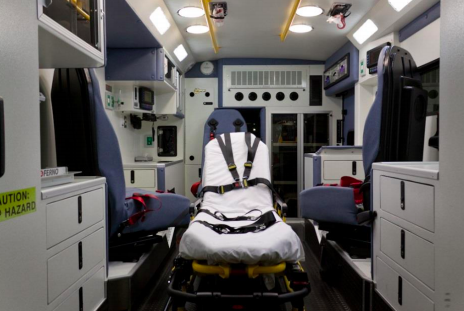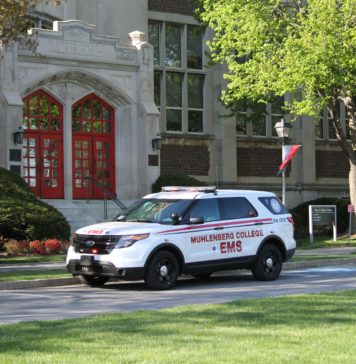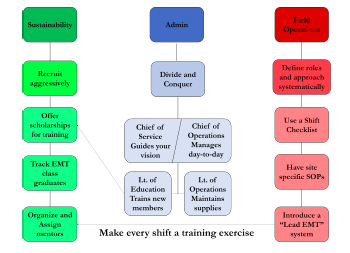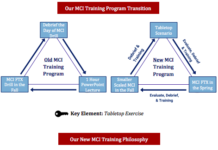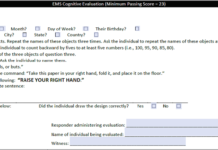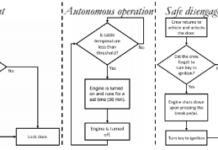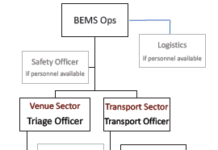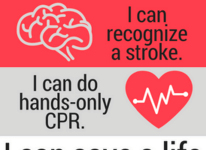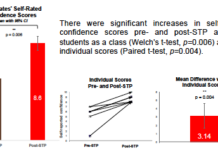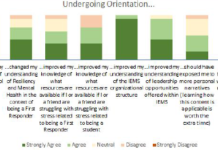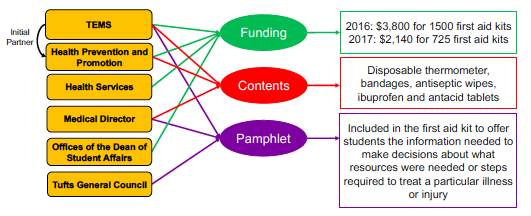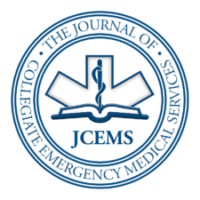MCI Training Program
In 2010, the University of Pennsylvania Medical Emergency Response Team (MERT) initiated the Mass Casualty Incident (MCI) training program. To better prepare student-EMTs to respond and manage a disaster scene, MERT is implementing a tabletop exercise module to ensure that MERT members are fluent in the Incident Command System (ICS), familiar with the MERT MCI operating guidelines, and able to size-up a scene appropriately.
“Continuing Care” with EC-ERT
EC-ERT created a program called “Continued Care” (CC) to provide a prehospital care resource for patients who required additional time to monitor their condition until care could be terminated. Through its design and implementation, CC reduces non-emergent ALS transports, thus reducing strain on the county EMS system and local emergencies rooms.
A Low-Cost Ambulance Idle Reduction System
Massachusetts Institute of Technology (MIT) EMS proposes a simple, automated system design that constantly monitors the temperature in the patient compartment, and only starts the vehicle engine and heating system temporarily when the temperature falls below a preset threshold in the cabin. MIT EMS estimates that their system can reduce the vehicle’s idling fuel consumption and engine run time by about 85%.
Implementing Stop the Bleed at Skidmore College
Skidmore College Emergency Medical Services (SCEMS) implemented a Stop to Bleed campaign at Skidmore College. SCEMS organized 20 free bleeding control trainings to train over 60 community members and incorporated $5,000 into the Skidmore Campus Safety 2018 budget for bleeding control equipment.
Optimizing Collegiate EMS Resources During Major Events
Brown EMS (BEMS) provides primary medical coverage at Spring Weekend (SWE), an annual outdoor concert drawing 6,000 attendees per day. By increasing its resources to include ground details and an additional ALS ambulance, BEMS aims to increase venue capacity, optimize response, and limit mutual-aid requirements.
Cardiac Health and Stroke Awareness Month (CHASAM)
Massachusetts Institute of Technology (MIT) EMS designed a non-certification learning opportunity for students who have not previously sought out CPR training. MIT EMS’s creation of an annual Cardiac Health and Stroke Awareness Month (CHASAM), piloted in 2016 and repeated in 2017, substantially increased the number of trained bystanders from a diverse selection of residential communities.
Feasibility of Asynchronous Learning in Collegiate EMS
Brown University EMS implemented a novel BLS Supervisor Training Program. Using asynchronous learning, Brown sought to optimize training time by promoting self-learning off-shift and outside of traditional didactic models using small-group, problem-based learning and online modules.
Piloting an Online New Member Orientation Program
Illini EMS created and implemented an online Orientation course for new members. Using a combination of original and adapted videos followed by a quiz, this self-paced program teaches and assesses the basics of topics including bleeding control, organizational structure, team dynamics, and First Responder mental health in under an hour.
Upstream of EMS Overutilization
Tufts Emergency Medical Services—alongside Tufts Health Promotion and Prevention—funded, created, and distributed first aid kits and informational content to all first-year students.


